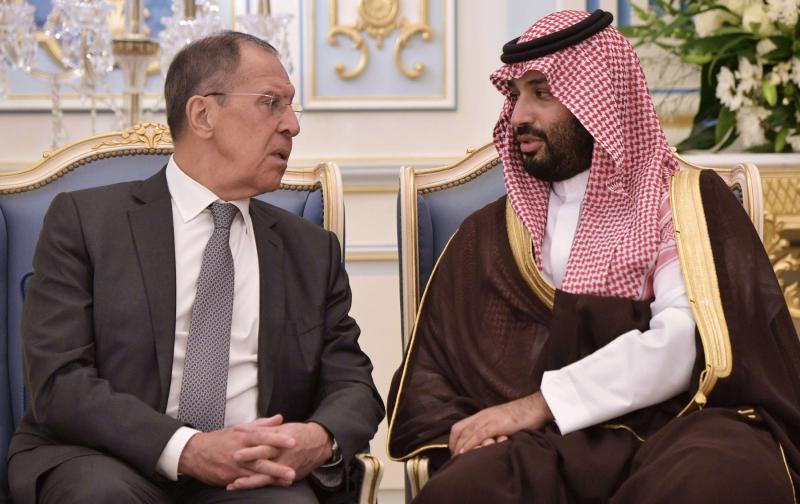Alwaght- While the West is seeking partners to isolate Russia in the middle of Ukraine war, Moscow is trying not to fall behind its rivals and is seeking to bring to its side some countries in the face of the Western ranks.
The Russian Foreign Minister Sergei Lavrov in recent weeks traveled to a number of oil and gas-rich counties to attract their support for Moscow in a full-scale economic war waged by the West against his country. This week is the time of Persian Gulf Arab states. The veteran foreign policy man arrived in Riyadh and is expected to meet (Persian) Gulf Cooperation Council officials in the Saudi capital. The visit is coming a day before the meeting of OPEC Plus, an organization including OPEC and some non-OPEC members, indicating that Ukraine crisis and the world energy are the key drivers of this visit.
Lavrov's visit comes as the US has been pushing Saudi Arabia and the UAE to raise their oil output to assuage the market turbulence and price hikes. But the two Arab countries resisted the request due to the considerations for their relations with Russia and also the resultant damage they could incur from low prices. In recent weeks, the US officials have made significant moves to minimize tensions and repair strained relations with Riyadh, but the Russians have stepped in earlier than the White House to prevent alternative oil from being pumped into the markets amid the Western sanctions on Russian oil. Although Russian officials are convinced that Saudi Arabia may not change its previous policy toward Ukraine crisis, they want assurance from the Saudis, given Washington's haste to neutralize the side effects of anti-Russian sanctions using its Arab allies' oil.
After the European Union approved Russian energy embargo, the West felt a desperate need to persuade Riyadh and Abu Dhabi to supply more oil to markets. The Americans, meanwhile, are bending over backwards to get the Saudis on board their policy. Lavrov, on the opposite side, counteracted with his visit for assurances that the oil-rich monarchies would keep the current export levels and not fill the empty Russian place.
Disappointed with the lifting of Western sanctions, Russia is trying to use its energy leverage to punish the West with the help of its allies, and it is especially important for the Russians to attract countries like Saudi Arabia, the world's largest oil exporter. Moscow now views Riyadh as a savior. In a way, Russia is trying to prevent the formation of a strong coalition of energy-rich countries against it to repel the effects of the sanctions and weaponize the energy in its face-off with the Europe. Saudi Arabia is accordant with Russia in the OPEC Plus and does not mind showing off to the West its ability to influence the energy markets amid the energy crunch caused by the Ukraine war in order to increase its political weight in international equations.
On the other hand, strengthening bilateral relations between Russia and Saudi Arabia is also important for the Saudis and the Saudi Crown Prince Mohammed bin Salman himself. As bin Salman is outraged by the Democratic administration's harsh stance on his human rights records, he is trying to use his approach to Russia to pressure Washington officials to strike a balance between Moscow and the West.
White House officials have been furious with Saudi Arabia's closeness to China and Russia in recent years, and bin Salman sees improving relations with Moscow and Beijing as a path to show that he is acting independently in his foreign policy. The Saudis, like other countries, have come to believe that the current world is no longer a unipolar one where the US alone is the sole decision-maker, and that it consists of a multipolar system in which Russia and China are influential actors. That is why bin Salman in Saudi Arabia, where he will soon ascend the throne, wants to interact with all the global actors and develop an important role in West-East confrontation.
The American policy in Ukraine and breaking of support promises to Kiev is giving Washington's Arab allies a reason to rethink their political and security strategies. Saudi Arabia and other Arab states now have the conviction that the US is no longer trustworthy and it is a mistake to rely on it in critical conditions. Saudi Arabia showed wisdom adopting a conservative approach to Ukraine developments as it tries to avoid a confrontation with Russia, a country after decades of stagnation stepped successfully in Syrian crisis in favor of order and in opposition to terrorism to bolster its past position in the Arab world developments.
Moreover, joining Moscow's policies to put pressure on the West will increase oil prices, and the kingdom can capitalize on this. Therefore, getting closer to Russia in the current situation plays into the Saudi hands. Saudi Arabia is trying to learn from the Ukraine war and diversify its relations with the world and get rid of its dependence on the West, which has overshadowed its policies for decades.
Moscow continues its teaming up campaign especially with the energy-rich states for a military and economic victory in opposition to the Western push to isolate it and counts on the Persian Gulf Arab monarchies for this objective.



























